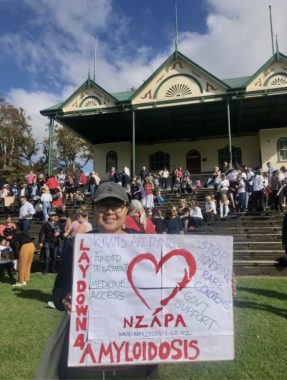We Won’t Stop Fighting for Positive Change in Healthcare Funding

I will always remember May 12 as a special day. That’s because last week, I spent that day with my daughter doing something close to our hearts.
We woke up that morning and prepared a sign to represent our amyloidosis patient association here in New Zealand. We attended a rally to petition the government to double the country’s budget for medications and to make healthcare accessible for all New Zealanders.
In 2013, my husband, Aubrey, 56, was diagnosed with hereditary ATTR amyloidosis. This devastating disease currently has no cure, though some promising and affordable treatment options exist in the United States and Europe. Unfortunately, in New Zealand, we still have quite a few hurdles to catch up with the rest of the countries in the Organization for Economic Cooperation and Development (OECD).
According to a 2019 IQVIA report commissioned by Medicine New Zealand, this island country with a population of about 5 million has the lowest number of publicly funded medicines in the OECD. All other countries have between three and 10 times as many publicly funded medicines.
Additionally, New Zealand takes twice as long to publicly fund medicine compared with other developed countries. During the period of analysis, from 2011 to 2017, it took New Zealand an average of 512 days to publicly fund a medication, compared with the 233-day average of the 19 other countries.
When someone is dying from an illness and the only chance of survival is receiving a treatment that is not attainable in their own country, the only option is to wait for the end to come. The odds are stacked against them. My husband knows this too well.
I thought about all of this as my daughter and I walked on the damp grass toward the grandstand where the rally was held, and I couldn’t help but get choked up a little when I saw the number of people there.
As U.S. President Theodore Roosevelt once eloquently observed, “This country will not permanently be a good place for any of us to live in unless we make it a reasonably good place for all of us to live in.”
New Zealand is my country, and I am proud to be her citizen. But there always will be areas that can be improved or reshaped to fit current needs, regardless of the country we live in. It is up to the people to inspire positive change.
My daughter and I proudly held up our sign that day with the strong hope of influencing positive change, if not now, then at least in the future. One day, this small step will help to usher in a new era for sufferers of rare disease in New Zealand.

Columnist Jaime Christmas proudly displays her sign calling for more healthcare funding in New Zealand, on May 12. (Photo by Joelle Christmas)
***
Note: FAP News Today is strictly a news and information website about the disease. It does not provide medical advice, diagnosis, or treatment. This content is not intended to be a substitute for professional medical advice, diagnosis, or treatment. Always seek the advice of your physician or other qualified health provider with any questions you may have regarding a medical condition. Never disregard professional medical advice or delay in seeking it because of something you have read on this website. The opinions expressed in this column are not those of FAP News Today or its parent company, Bionews, and are intended to spark discussion about issues pertaining to familial amyloid polyneuropathy.







Leave a comment
Fill in the required fields to post. Your email address will not be published.